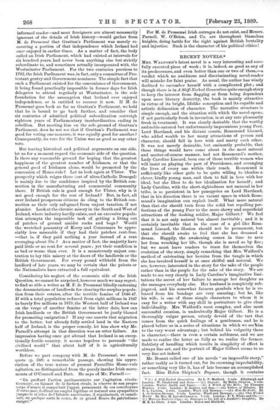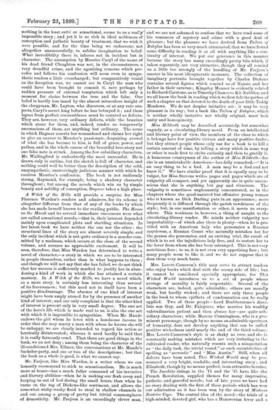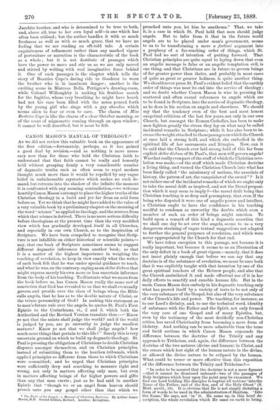RECENT NOVELS.*
Mas. WALFORD'S latest novel is a very interesting and care- fully executed piece of work ; it is, indeed, as good as any of its predecessors, and even better than one or two of them,—a verdict which no assiduous and discriminating novel-reader will mistake for faint praise. As usual, the author has wisely declined to encumber herself with a complicated plot ; and though there is in A Stiff-Necked Generation quite enough story to keep the interest from flagging or from being dependent upon mere literary dexterity, the book is mainly attractive in virtue of its bright, lifelike conception and its capable and artistic delineation of character. The narrative structure is simple enough, and the situation with which the novel-opens, if not particularly fresh in invention, is at any rate pleasantly fresh in treatment. It was clearly desirable that the worthy and noble-natured but unfortunately impecunious young Peer, Lord Hartland, and his distant cousin, Rosamund Liscard, who added wealth to her many attractions of person and character, should fall in love with and marry each other. It was not merely desirable, but eminently probable, that these things would have come about in the most natural and matter-of-course manner, had not Rosamund's mother, Lady Caroline Liscard, been one of those terrible women who will insist on playing the part of Providence, and arranging the lives of every one within their reach. Rosamund is sufficiently like other girls to be quite willing to idealise a clever, kindly young man, and then to fall in love with her ideal, but she likes to do her idealisation for herself ; and Lady Caroline, with the short-sightedness not unusual in her tribe, is so persistent in her panegyrics on Lord Hartland, that in his direction there is no vacant space in which Rosa- mund's imagination can exploit itself. What more natural than that she should turn from the solid but repelling per- fections of the young Peer to the more showy and superficial attractions of the dashing soldier, Major Gilbert ? We feel that it is not only natural but almost inevitable ; and it is certainly inevitable that in the case of a girl like Rosa- mund Liscard, the illusion should not be permanent, but that she should awake to feel that she has dreamed a dream. Happily, the awakening comes in time to save her from wrecking her life, though she is saved as by fire; but we must leave readers to trace for themselves the evolution of the story, simply remarking that Mrs. Walford'a method of extricating her heroine from the tangle in which she has involved herself is at once skilful and natural. We are, however, interested in the story for the sake of the people rather than in the people for the sake of the story. We are made to see very clearly in Lady Caroline's imaginative limi- tations the secret of her failure to manage her daughter as she manages everybody else. Her husband is completely sub- jugated, and his somewhat fatuous gambols when he is re- leased from his bondage are very amusing ; but he, like his wife, is one of those simple characters to whom it is easy for a writer with any skill in portraiture to give clear individuality. Mrs. Walford's most complex, and also most successful creation, is undoubtedly Major Gilbert. He is a thoroughly vulgar person, utterly devoid of the tact that comes from the quick feelings of a gentleman, and he is placed before us in a series of situations in which we see'llim to the very worst advantage ; but behind his vulgarity there is character,—there is even a certain nobleness, and we are made to realise the latter as fully as we realise the former. Subtlety of handling which results in simplicity of effect is always fine art, and the portrait of Major Gilbert seems to us very fine art indeed.
Mr. Besant called one of his novels " an impossible story," rather rashly as it turned out, for its crowning improbability, or something very like it, has of late become an accomplished fact. Miss Helen Shipton's Darman though it contains
• (1.) A Stiff-Necked Generation. By L. P. Watford. 3 vele. Edinburgh and London : W. Blackwood and Sons.—(2.) Dagmar. By Helen Shipton. S vols. London: Walter Smith and Innes.—(3.) A Witch of the Hills. By Florence Warden. 2 vols. London : R. Bentley and Son.—(44 Toilers of Babylon.. By B. L. Farjeon. 3 vols. London : Ward and Downey.—(5.) Miss Hi dreth. By A. de Grasse Stevens. 3 vols. London Ward and Downey.—(6.) This Wicked World By Mrs. H. Lovett-Cameron. 3 vols. London: F. V. White and Co.— (7.) Mistress Beatrice Cope ; or, Passages in the Life of a Jacobite's Daughter. By M. E. Le Clem. 2 vole. London: Hunt and Blackett. nothing in the least outr4 or sensational, seems to us a really' impossible story ; and yet it is so rich in ideal nobleness of conception and pathetic beauty of treatment, that we wish it were possible, and for the time being we endeavour, not altogether unsuccessfully, to subdue imagination to belief. What incredibility there is, inheres not in incident but in character. The assumption by Maurice Caryl of the name of his dead friend Claughton was not, in the circumstances, a very dreadful crime, and the agonising remorse which pre- cedes and follows his confession will seem even to sympa- thetic readers a little overcharged ; but comparatively venial as the deception was, we cannot see in Caryl the man who could have been brought to commit it, save perhaps by sudden pressure of external temptation which left only a moment for choice between the true and the false. Our belief is hardly less taxed by the almost miraculous insight of the clergyman, Mr. Layton, who discovers, or at any rate sus- pects, Caryl's secret long before he has betrayed it ; and these lapses from perfect vraisernblance must be counted as defects. They are, however, very ordinary defects, while the beauties which atone for them, and, indeed, render us temporarily unconscious of them, are anything but ordinary. The scene in which Da gmar asserts her womanhood and claims her right to give an answer to Maurice's passionate, despairing avowal of what she has become to him, is full of grace, power, and pathos, and in the whole course of the beautiful love-story not one false note is struck. Among the few subsidiary characters, Mr. Wallingford is undoubtedly the most successful. He is drawn only in outline, but the sketch is full of character, and nothing could well be better than the description of the cold, unsympathetic, unswervingly judicious manner with which he receives Maurice's confession. The book is not uniformly strong, Raymond, for example, being a shadowy character throughout ; but among the novels which win us by simple beauty and nobility of conception, Daginar takes a high place.
A Witch of the Hills will provide a surprise for Miss Florence Warden's readers and admirers, for its scheme is altogether different from that of any of the books by which she has made herself known to the reading public. The House on the Marsh and its several immediate successors were what are called sensational novels,—that is, their interest depended mainly upon complicated plots and startling situations. In her latest book we have neither the one nor the other : the structural lines of the story are almost severely simple, and the only incident which is not quite ordinary is a murder com- mitted by a madman, which occurs at the close of the second volume, and arouses no appreciable excitement. It will be seen, therefore, that Miss Warden has determined to write a novel of character,—a story in which we are to be interested in people themselves, rather than in what happens to them ; and though we will not say that she has failed, we do not think that her success is sufficiently marked to justify her in aban- doning a kind of work in which she has attained a certain mastery. In A Witch of the Hills, we have a novel which, as a mere story, is certainly less interesting than several of its forerunners ; but this need not in itself have been a positive disadvantage. The absence of one kind of interest might have been amply atoned for by the presence of another kind of interest ; and our only complaint is that the other kind of interest is present only in very small degree. The one act of the hero's life which is made real to us, is also the one act with which it is impossible to sympathise. When Mr. Maude endows the girl whom he loves with a handsome income in order that she may marry a man with whom he knows she will be unhappy, we are clearly intended to regard his action as heroically disinterested ; whereas it need hardly be said that it is really fatuously cruel. That there are good things in the book, we no not deny ; among them being the character of the ill-conditioned Mrs. Ellmer, the conversations at Mr. Mande's bachelor-party, and one or two of the descriptions ; but that the book as a whole is good, is what we cannot say.
Mr. Farjeon, like Miss Warden, is a writer whom we can honestly recommend to stick to sensationalism. He is much more at home—has a much fuller command of his inventive and literary abilities—when he is making our flesh creep and keeping us out of bed during the small hours, than when he turns on the tap of Dickens-like sentiment, and allows the somewhat wishy-washy flood to steal in shallow channels in and out among a group of pretty but trivial commonplaces of domesticity. Mr. Farjeon is an exceedingly clever man, and we are not ashamed to confess that we have read some of his romances of mystery and crime with a good deal of pleasure ; but the pleasure we have derived from Toilers of Babylon has been so very much attenuated, that we have found some difficulty in reading it at all with anything like a con- tinuity of interest. We put our grievance in this manner because the story has many exceedingly pretty bits which, if taken separately, are very attractive, though they all remind us a little too strongly of the handling of Mr. Farjeon's master in his most idiosyncratic moments. The collection of imaginary portraits brought together by Charles Dickens contains several figures which remind us of Nansie and her father in their caravan ; Kingsley Manner is evidently related to Richard Carstone, as is Timothy Chance to Kit Nubbles; and we all know the book in reading which we first felt the pathos of such a chapter as that devoted to the death of poor little Teddy Meadows. We do not despise imitative art : it may be very pleasant in its way ; but a book like Toilers of Babylon, which is neither wholly imitative nor wholly original, must lack unity and homogeneity.
Miss Hildreth may be described accurately, but somewhat vaguely, as a circulating-library novel. From an intellectual and literary point of view, the members of the class to which it belongs have few positive virtues and many positive faults ; but they attract people whose only use for a book is to kill a certain amount of time, by telling a story which in some way or other is made first to excite curiosity and then to gratify it. A humorous countryman of the author of Miss Hildreth—for she is an unmistakable American—has drily remarked,—" It is an easy thing to be a fool. A man may be a fool and not know it." We have similar proof that it is equally easy to be vulgar, for Miss Stevens writes pages and pages which are of vulgarity all compact, and yet apparently she is quite uncon- scious that she is anything but gay and vivacious. The vulgarity is sometimes unpleasantly concentrated, as in the chapters where the good-natured but offensive young woman who is known as Dick Darling puts in an appearance; more frequently it is diffused through the garish tawdriness of the style ; but, in one manifestation or other, it meets us every- where. This weakness is, however, a thing of naught to the circulating-library reader. He minds neither vulgarity nor improbability—of which also there is plenty—when he is pro- vided with an American lady who personates a Russian murderess, a Russian Count who naturally mistakes her for the person she personates, and an exciting trial, the result of which is to set the injudicious lady free, and to restore her to the lover from whom she has been estranged. This is not very nutritious fare ; to us, it is not even very appetising fare ; but many people seem to like it, and we do not suppose that it does them very much harm.
Mrs. Lovett-Cameron's title may serve to attract readers who enjoy books which deal with the seamy side of life ; but it cannot be considered specially appropriate, for This Wicked World introduces us to a set of people whose average of morality is fairly respectable. Several of the characters are, indeed, quite admirable ; others are morally weak, but hardly wicked ; and there are only three people in the book to whom epithets of condemnation can be really applied. Two of these people—Lord Brabberstone's disso- lute son Guy, and Dr. Fairgrave, who marries his wealthy valetudinarian patient and then abuses her—are quite sub- sidiary characters ; while Marcus Cunningham, who is a pro- minent personage, though by no means an admirable specimen of humanity, does not develop anything that can be called positive wickedness until nearly the end of the third volume. Mrs. Lovett-Cameron's style is as shaky as ever, and she is constantly making mistakes which are very irritating to the cultivated reader, who naturally resents such a misquotation as " the daily task, the trivial round," or such eccentricities of spelling as " accrostic " and " Miss Austin." Still, when all defects have been noted, This Wicked World may be pro- nounced a very bright, readable, and interesting story ; and Elizabeth, though by no means perfect, is an attractive heroine.
The Jacobite risings in the '15 and the '45 have, like the French Revolution, supplied themes for many impressive, pathetic, and graceful novels ; but of late years we have had no story dealing with the first of these periods which has won our admiration as it has been won by the story of Mistress Beatrice Cope. The central idea of the novel—the trials of a high-minded, devoted girl, who has a Hanoverian lover and a. Jacobite brother, and who is determined to be true to both, and, above all, true to her own loyal self—is one which has often been utilised ; but the author handles it with so much freshness as well as with so much grace, that we have no feeling that we are reading an oft-told tale. A certain exquisiteness of refinement rather than any marked vigour of portraiture or narration is the characteristic of the book as a whole ; but it is not destitute of passages which have the power to move and stir us as we are only moved and stirred by writing with real imaginative force behind it. One of such passages is the chapter which tells the story of Beatrice Cope's daring ride to Goodrest to warn the brother who is in imminent danger ; another is the exciting scene in Mistress Delia Pettigrew's drawing-room, while Colonel Willoughby is making his fruitless search for the fugitive, whose very breathing he might have heard, had not his ears been filled with the notes poured forth by the young girl who sings with a gay abandon which seems alien to fear or even to care. The charm of Miss Beatrice Cope is like the charm of a clear October morning, or of the scent of mignonette coming through an open window; it cannot be well described, but it must be felt.




































 Previous page
Previous page